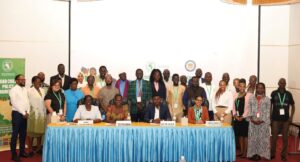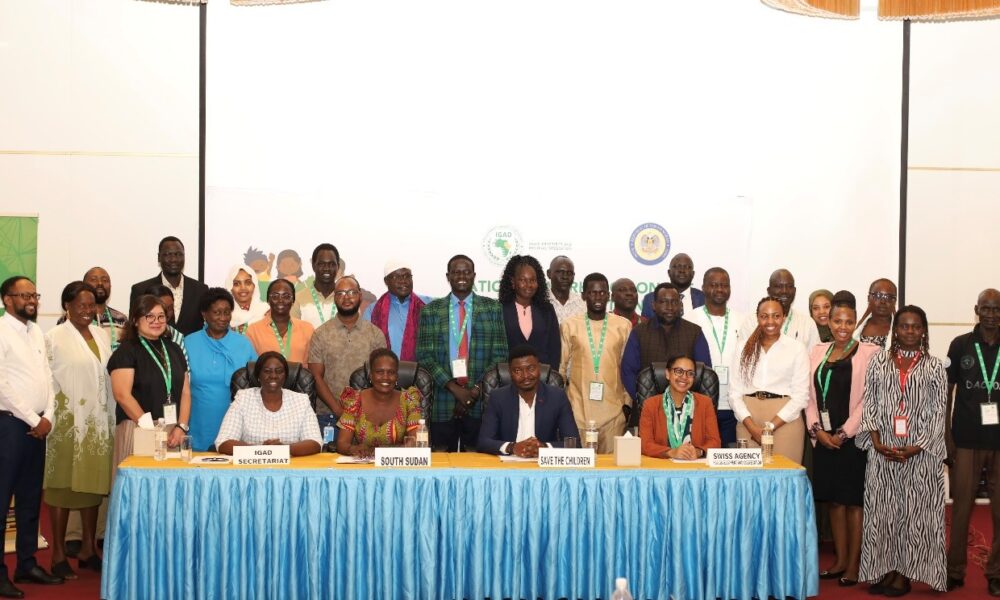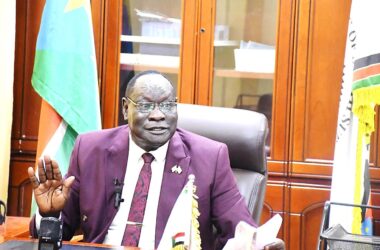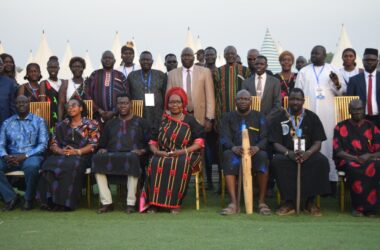
By Lodu William Odiya
The Intergovernmental Authority on Development (IGAD) has launched Development of National Action Plan for the Child policy framework in South Sudan.
Addressing the participants during the event on Tuesday, Dr. Victoria Anib Majur, the head of the Social Development Unit of the IGAD said the gathering marked an important milestone as it was the first national-level engagement.
She emphasized that in 2024, the national ministries and agencies made invaluable contributions during the national consultations that shaped the IGAD Child Policy.
“Today, we return to South Sudan to build on that foundation and to discuss how this Policy can be translated into action” she said.
Anib commended the Government of South Sudan for its ongoing efforts to advance the rights and well-being of children, in line with both national priorities and international commitments.
Dr. Anib underscored efforts that IGAD seeks to support and strengthen through the implementation of the IGAD Child Policy.
“The purpose of this workshop is to guide the development of a National Action Plan (NAP) that will translate policy commitments into clear strategies, activities, and timelines” she said.
She added that the Policy would define roles and responsibilities across government institutions, civil society, the private sector, and development partners.
Additionally, Anib emphasized the it would identify the financial, technical, and human resources required for implementation, and guide effective resource mobilization.
Furthermore, establishing indicators, targets, and accountability mechanisms, in line with the IGAD Child Policy Results Monitoring Framework.
“Developing a National Action Plan is a vital step in moving from commitment to concrete action. A well-structured NAP strengthens policy coherence, ensures efficient use of resources, and creates mechanisms for accountability and participation” she highlighted.
She underlined the NAP would also provides a roadmap that aligns national priorities with regional and global commitments, while enabling monitoring, evaluation, and evidence-based decision-making.
Anib stated that NAP would further enhances transparency, resource mobilization, and citizen engagement including the voices of children themselves.
On his part, Christopher Nyamandi, the Country Director of Save the Children in South Sudan said that through the collective commitment of IGAD Member States, including the Government of South Sudan, IGAD, and partners, the framework was adopted in December 2024.
“This milestone demonstrated the region’s united resolve to safeguard the rights of all children and ensure they grow up in a safe and nurturing environment” he stated.
Nyamandi underlined they had witnessed another significant achievement, which is the development of the Results Monitoring Framework.
“This framework is not just a technical tool; it’s a direct response to the voices of Member States during the Policy development process, and it echoes the calls made by children themselves during IGAD’s first commemoration of the Day of the African” he explained.
He acknowledged the continued efforts of Save the Children South Sudan, working closely with the country leadership at all levels on education, health, child protection, nutrition, and inclusive humanitarian response to advance children’s rights and protection in the country.
“As we turn our attention to the development of South Sudan’s National Action Plan, this workshop provides a timely and critical opportunity to translate regional commitments into concrete, actionable steps at the national level.
Nyamandi reaffirmed his organization’s commitment to stand alongside the Government of South Sudan in the development and, most importantly, the implementation of the National Action Plans.
“I would like to sincerely thank the Government of South Sudan for its continued commitment, and to IGAD for its dedication to advancing child-sensitive approaches across the region in its work” he stated.
Children constitute almost half of the general population of the IGAD region. Despite being a significant portion of the region’s demography, they are far from being provided with a fulfilling environment where they could strive and become a driving force for the regio’s economic, social and political development.
Many vulnerabilities stemming from individual, household, community and structural level factors threaten their rights and wellbeing in the region.



